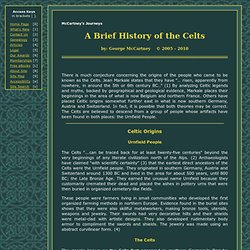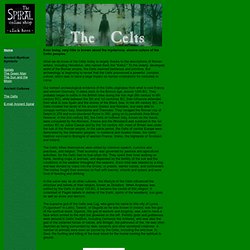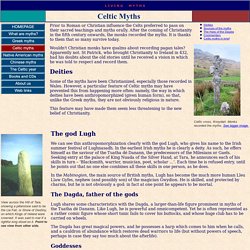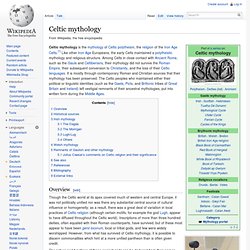

Irish & Celtic Legends & Lore. Celtic. Celtic Culture - Home. A Brief History of the Celts. There is much conjecture concerning the origins of the people who came to be known as the Celts.

Jean Markale states that they have “… risen, apparently from nowhere, in around the 5th or 6th century BC…” (1) By analyzing Celtic legends and myths, backed by geographical and geological evidence, Markale places their beginnings in the area of what is now Belgium and northern France. Others have placed Celtic origins somewhat further east in what is now southern Germany, Austria and Switzerland. In fact, it is possible that both theories may be correct. The Celts are believed to descend from a group of people whose artifacts have been found in both places: the Urnfield People. Celtic Origins Urnfield People The Celts "...can be traced back for at least twenty-five centuries" beyond the very beginnings of any literate civilization north of the Alps. (2) Archaeologists have claimed “with scientific certainty” (3) that the earliest direct ancestors of the Celts were the Urnfield people.
Ancient Celts Timeline. Celtic lifestyle facts. Celts - information on celtic culture, ritual, rites, pagansim, druids, wiccan, knotwork, symbols. Even today, very little is known about the mysterious, elusive culture of the Celtic peoples.

What we do know of the Celts today is largely thanks to the descriptions of Roman writers, including Herodotus, who named them the "Keltoi. " To the orderly, developed world of the Roman empire, the Celts seemed barbarous and primitive. But archaeology is beginning to reveal that the Celts possessed a powerful, complex culture, which was to have a large impact on human civilisations for centuries to come. Our earliest archaeological evidence of the Celts originates from what is now France and western Germany.
It dates back to the Bronze age, around 1200 BC. The Celtic tribes themselves were united by common speech, customs and practises, and religion. In the same way as all other cultures, the lifestyle of the Celts influenced the structure and beliefs of their religion, known as Druidism. The supreme god of the Celts was Lug, who gave his name to this city of Lyons ("Lugundum" in Latin). Celtic Myths. We can see this anthropomorphization clearly with the god Lugh, who gives his name to the Irish summer festival of Lughnasadh.

In the earliest Irish myths he is clearly a deity. As such, he offers himself as the saviour of the Tuatha dé Danann, the predecessors of the Milesians or Gaels. Seeking entry at the palace of King Nuada of the Silver Hand, at Tara, he announces each of his skills in turn – ‘Blacksmith, warrior, musician, poet, scholar …’.
Each time he is refused entry, until he points out that no one else combines all these skills in one person, as he does. In the Mabinogion, the main source of British myths, Lugh has become the much more human Lleu Llaw Gyfes, nephew (and possibly son) of the magician Gwydion. The Dagda, father of the gods Lugh shares some characteristics with the Dagda, a larger-than-life figure prominent in myths of the Tuatha dé Danann. Goddesses Powerful though these gods were, the Celtic goddesses were perhaps even more so. Celtic mythology.
Overview[edit] Though the Celtic world at its apex covered much of western and central Europe, it was not politically unified nor was there any substantial central source of cultural influence or homogeneity; as a result, there was a great deal of variation in local practices of Celtic religion (although certain motifs, for example the god Lugh, appear to have diffused throughout the Celtic world).

Inscriptions of more than three hundred deities, often equated with their Roman counterparts, have survived, but of these most appear to have been genii locorum, local or tribal gods, and few were widely worshipped. However, from what has survived of Celtic mythology, it is possible to discern commonalities which hint at a more unified pantheon than is often given credit. Celtic mythology is found in a number of distinct, if related, subgroups, largely corresponding to the branches of the Celtic languages: Historical sources[edit] Irish mythology[edit] Cuchulainn carries Ferdiad across the river.